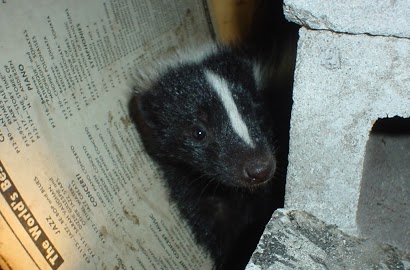If the thought of rabies sends chills up your spine, you’re not alone. Most pets are vaccinated against this concerning disease, but wildlife is not. If you encounter a skunk, or any other animal in the wild, with rabies, it’s best to get out of the way. On the other hand, if there’s a rabid skunk on your property, you may be worried about your children and pets contracting the disease. If you’re sure the animal has rabies symptoms in Durham or a surrounding area, call us right away for prompt and safe removal. If you aren’t sure what the signs of rabies are and how to distinguish a rabid animal from an irritated one, read on.
What Are Common Rabies Symptoms in Durham?
Rabies is a virus that’s transmitted by saliva from the infected animal — meaning that an animal would have to bite another one for it to be transmitted. Unlike other viruses, it’s not transmitted by blood or through the air, but it is highly dangerous as it affects the central nervous system. It’s rare for a human or domesticated animal to be infected with rabies, but it’s still good to know the signs.
5 Symptoms of Rabies in Skunks
If you’re wondering how to get rid of skunks in Durham or you’re simply trying to educate yourself about how to best protect your pets, consider the five signs of the disease below. If you have any doubt, do not approach the animal in question.
1. Aggression
Using the term “rabid” to describe an individual who is snarling and angry isn’t a coincidence. Rabid animals are often irritable, vicious, and can attack without warning.
2. Foaming at the mouth
Rabies may make it hard for an infected skunk to swallow, which causes the saliva to pool or “foam” as it gathers in the mouth. This tell-tale sign of the disease should immediately tip you off to a rabies infection.
3. Lack of Fear of Humans
Paradoxically, rabid animals may show no fear of humans or other, larger animals (such as your large dog) that would normally prompt them to run in the opposite direction or defend themselves against the perceived threat. If a skunk is acting strange or overly friendly, be sure to stay far away and call pest control as soon as you can.
4. Wandering Around in the Daytime
Rabid animals that are typically nocturnal or crepuscular (the term for animals who are most active at dawn and dusk, such as cats, mice, deer, foxes, and skunks) may decide to wander through your yard or into your garage in the middle of the day. If you see an animal at a time of day you normally wouldn’t, consider rabies as a cause.
5. Appearing “Drunk” or Wobbly
Because rabies affects the central nervous system, it may cause an infected animal or a person to look drunk, disoriented, or experience a loss of balance. If you see a skunk wobbling toward you during daylight hours and not appearing to be fearful of you or your pets, you’ve got a problem. Leave the area immediately, get your pets inside, and don’t try to contain the skunk yourself. There can be several other reasons — including poisoning or other viral and bacterial infections — for this symptom, but it’s a good idea to suspect rabies to protect yourself and your family.
Get In Touch With Skedaddle Wildlife in Durham
If you’ve been bitten by a skunk with rabies, or if you’re not sure you’ve been bitten, it’s best to call your doctor or go to the emergency room immediately. If your problem is a potentially rabid skunk on your property, let us take care of it for you. Get in touch today for experienced, humane pest control in Durham and the surrounding areas.



